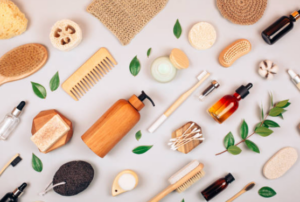Fact from Fiction




In the dazzling realm of beauty and skincare, where innovation meets self-expression, an ever-growing movement is taking center stage — the rise of cruelty-free beauty products. With consumers increasingly seeking products that resonate with their values, ethical considerations have become paramount in purchasing decisions. The allure of cruelty-free beauty lies not only in its promise of glamour but also in its commitment to compassion and sustainability.
However, as the popularity of cruelty-free beauty products surges, so too does the cloud of misinformation surrounding them. In this comprehensive blog, we embark on a journey to dispel the myths and unravel the truths about cruelty-free beauty. Armed with factual information, we aim to empower you, the discerning consumer, to make choices that not only enhance your beauty but also reflect your commitment to a kinder, more ethical world.
As we delve into the myths surrounding cruelty-free products, we invite you to question preconceived notions, explore the nuances of ethical beauty, and discover a wealth of options that align with your values. Together, let’s navigate the intricate landscape of the beauty industry, where compassion and glamour coalesce in a harmonious celebration of conscious consumerism.
Myth 1: Cruelty-Free Means Lower Quality
One prevailing misconception about cruelty-free beauty products is the belief that they are of lower quality compared to their counterparts that undergo animal testing. This assumption is rooted in the idea that testing on animals is necessary to ensure product safety and efficacy.
However, advancements in technology and alternative testing methods have proven otherwise. Many cruelty-free brands invest heavily in innovative techniques, such as in vitro testing and computer modeling, to guarantee the safety and effectiveness of their products. In fact, some cruelty-free brands have gained recognition for their commitment to quality, debunking the myth that cruelty-free products are subpar.
Moreover, cruelty-free does not imply a compromise on luxurious ingredients or cutting-edge formulations. Numerous cruelty-free brands boast high-end, innovative products that cater to a diverse range of skincare and beauty needs.
Myth 2: All Cruelty-Free Products Are Vegan
A common misconception among consumers is the assumption that cruelty-free and vegan are interchangeable terms. While both signify a commitment to ethical practices, they address different aspects of product formulation.
Cruelty-free products are those that do not involve animal testing at any stage of production. On the other hand, vegan products do not contain any animal-derived ingredients. While there is an overlap between the two categories, not all cruelty-free products are vegan, and vice versa.
It’s essential for consumers to be aware of these distinctions to make choices that align with their values. Some cruelty-free products may still include ingredients like beeswax, honey, or lanolin, which are derived from animals. Checking labels and understanding the brand’s values are crucial steps in ensuring you make a fully informed decision.


Myth 3: Cruelty-Free Products Are Limited in Variety
Another prevalent myth is that cruelty-free beauty products are limited in variety, catering only to a niche market. However, the reality is quite the opposite. The global demand for cruelty-free and ethical products has prompted an impressive surge in the availability and diversity of cruelty-free options.
Leading beauty brands, both established and emerging, are recognizing the shift in consumer preferences and are actively transitioning to cruelty-free practices. As a result, consumers now have a wide array of choices across different price points, styles, and formulations.
From drugstore brands to high-end luxury labels, the market for cruelty-free products is flourishing. Whether you’re looking for vibrant eyeshadows, long-lasting lipsticks, or nourishing skincare, cruelty-free options abound, catering to diverse tastes and preferences.
Myth 4: Cruelty-Free Certification is a Marketing Gimmick
Some skeptics argue that cruelty-free certification is merely a marketing strategy employed by brands to attract a specific demographic. While it’s true that the term “cruelty-free” has gained popularity in recent years, genuine certification involves a rigorous process that verifies a brand’s commitment to cruelty-free practices.
Certifications from reputable organizations, such as Leaping Bunny and PETA (People for the Ethical Treatment of Animals), require brands to undergo thorough audits of their supply chains and production processes. These organizations ensure that no animal testing is conducted, and they often require brands to pledge against using raw materials tested on animals.
Consumers can trust these certifications as reliable indicators of a brand’s dedication to cruelty-free practices. It’s important to look for recognized symbols on product packaging, as these certifications provide assurance and transparency.


Myth 5: Cruelty-Free Products Are Expensive
A common misconception is that cruelty-free beauty products come with a hefty price tag, making ethical choices a luxury. While it’s true that some high-end cruelty-free brands may have premium pricing, the market also offers a plethora of affordable options.
Numerous drugstore and budget-friendly brands have embraced cruelty-free practices without compromising on quality. As consumer demand for ethical products grows, more brands are recognizing the need to make cruelty-free choices accessible to a wider audience.
Shopping for cruelty-free products doesn’t necessarily mean breaking the bank. By exploring different brands and staying informed about affordable options, consumers can build a cruelty-free beauty routine that suits their budget.
Myth 6: All Products Labeled “Not Tested on Animals” Are Cruelty-Free
One of the most common misconceptions is assuming that any product labeled “not tested on animals” is automatically cruelty-free. Unfortunately, this is not always the case. The phrasing can be misleading, as it may only refer to the final product and not account for individual ingredients tested on animals during the formulation process.
To ensure a product is genuinely cruelty-free, it’s essential to look for specific certifications or additional information provided by the brand. Transparent companies often share detailed information about their cruelty-free status, including their stance on animal testing at all stages of production.
Consumers should be cautious and conduct thorough research to verify a brand’s commitment to cruelty-free practices before making a purchase. This includes checking for cruelty-free certifications and examining the brand’s policies regarding ingredient testing.


Myth 7: Animal Testing is Required by Law
One of the persistent myths surrounding cruelty-free beauty products is the belief that animal testing is a legal requirement in certain regions. While this may have been true in the past, regulations are evolving, and many countries and regions have implemented bans or restrictions on cosmetic animal testing.
In the European Union, for example, a comprehensive ban on the testing of finished cosmetic products and their ingredients on animals has been in place since 2013. Other countries, including India, New Zealand, and several states in the United States, have also implemented or proposed legislation to restrict or ban animal testing for cosmetics.
Consumers can support these legislative efforts by choosing cruelty-free products and advocating for stricter regulations in regions where animal testing is still permitted. By doing so, they contribute to the global movement towards a cruelty-free beauty industry.
Conclusion
In the radiant tapestry of beauty and self-care, our exploration into the realm of cruelty-free beauty products has unveiled a narrative rich in compassion, transparency, and ethical choices. As we conclude this journey, it is essential to reflect on the transformative power that conscious consumerism holds within the beauty industry.
The myths and misconceptions we’ve dismantled are not mere shadows but reflections of an evolving industry. Today, cruelty-free beauty stands as a testament to the collective demand for change, echoing the sentiments of consumers who envision a world where glamour coexists harmoniously with compassion.
By dispelling the myth that cruelty-free equates to lower quality, we affirm that innovation and ethical practices go hand in hand. Brands committed to cruelty-free formulations not only prioritize the well-being of animals but also invest in cutting-edge technologies, delivering products that rival, if not surpass, their non-cruelty-free counterparts.
The distinction between cruelty-free and vegan has been clarified, emphasizing that while both embody ethical values, they address different aspects of product formulation. Armed with this knowledge, consumers can now make choices that align not only with their compassion for animals but also with their personal lifestyle preferences.
The myth that cruelty-free products are limited in variety has been shattered, revealing a vibrant landscape where inclusivity reigns supreme. From budget-friendly drugstore brands to luxurious high-end labels, the diversity of cruelty-free options is a testament to the industry’s adaptability and responsiveness to changing consumer preferences.
Certification, once misconstrued as a mere marketing ploy, emerged as a beacon of trust. Recognized symbols from entities such as Leaping Bunny and PETA provide consumers with a reliable compass, guiding them towards brands that have undergone rigorous scrutiny to earn their cruelty-free status.
Financial accessibility was addressed, debunking the misconception that cruelty-free products are exclusively reserved for luxury budgets. The market now boasts a plethora of affordable options, allowing consumers to curate a cruelty-free beauty routine that aligns seamlessly with their financial realities.
The notion that all products labeled “not tested on animals” are automatically cruelty-free was demystified, emphasizing the importance of scrutinizing certifications and brand policies. In a landscape where transparency is paramount, consumers wield the power to make choices rooted in authenticity and integrity.
The myth that animal testing is a legal requirement in certain regions was dispelled, highlighting the global shift towards legislative bans and restrictions. Consumers, armed with knowledge, can actively participate in advocating for stricter regulations and contribute to a world where animal testing for cosmetics becomes a thing of the past.
In this journey, we’ve celebrated the transformative power of conscious consumerism. Beauty is no longer a singular pursuit of aesthetics; it is a reflection of values, a commitment to ethical choices that resonate with the compassionate soul within each consumer.

